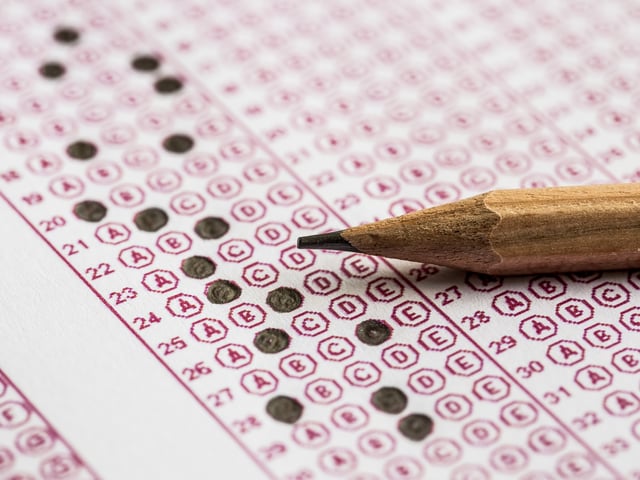
How to Study for the ACT in One Week
Getting ready for American College Testing (the ACT) can be a source of anxiety. At first, it may feel like you have plenty of time to study, but as the examination date gets closer, many feel the urge to cram.
As many as 40 percent of students admit to experiencing some test anxiety. If you are suddenly a week out from the exam and feel there is much more to learn, it may seem too late.
The good news is a week still can be an adequate amount of time to study for this college admissions test. You can also do several things outside your studies to prepare for the test. Read on to find out how you can better prepare for the ACT a week from exam day.
Day One: Taking ACT Practice Tests
If you still need to do so, begin the study process by taking an ACT practice test. Much like the actual exam, ACT practice tests are typically divided into four sections, English, Mathematics, Reading, and Science.
English
During the ACT, you will have 45 minutes to answer 75 English questions. You will read five essays or passages, along with the questions. The English section will assess your editing skills, ability to choose the most effective language, and ability to critique a writer’s intent. The goal is to identify errors and supply the best correction, though some questions will include a “no change needed” response.
The English section will also assess your understanding of writing and your knowledge of style. Your score will be based on three categories: conventions of standard English, language knowledge, and writing production.
Mathematics
During the mathematics section, there are 60 questions to answer within a 60-minute time frame. You can use a calculator.
The mathematics questions will cover algebra, functions, geometry, number and quantity, statistics and probability, and ideas like the mean, median and mode, percentages, volume, surface area, and averages.
Reading
The reading section will assess reading comprehension skills. There are 35 minutes allotted to answer 40 questions. Passages will be provided, and you must draw conclusions or inferences from the writing. In some cases, two short excerpts may be given to assess the same topic for comparison questions.
For this section, it is vital to manage time wisely. Passages must be read quickly, but with enough care to retain the information, so it’s essential to focus on important details.
There are three categories used to score this section of the ACT. Craft and structure look at your analytical skills, integration of knowledge and ideas assesses your ability to determine the purpose of a piece, and key ideas and details look at your ability to identify the theme or central idea.
Science
During the ACT science section, 40 questions need to be answered in 35 minutes. This section assesses the knowledge of science concepts, including chemistry, biology, physics, astronomy, geology, and earth sciences.
You will be evaluated on your ability to make predictions and draw conclusions and should feel confident reading data in charts, graphs, tables, and diagrams. Finally, you must be able to evaluate scientific outcomes and processes to determine if the conclusions presented are valid.
Tips for the ACT Practice Test
Allow yourself the same time to take an ACT practice test as you would the actual exam. Doing so will help you get a realistic understanding of your time management skills on the test. For example, if you do very well on the math portion, but it takes you two hours, you know you need to find ways to answer the questions faster before test day.
Taking an ACT practice test helps you get more comfortable with the type of questions included in the exam. Because the test is lengthy, take breaks and walk around, as you will be able to during the actual exam.
Once you have completed the practice test, note the material or subject matter that makes you feel least comfortable. Identify any mistakes and work on correcting them as you study for the ACT throughout the week. Use your study time to fill in your knowledge gaps so you can perform to the best of your ability during the exam.
Get Lots of Rest
Finish day one by going to bed one hour earlier than usual. It is easy to stay awake late, especially if you feel stressed about your upcoming exam. Going to bed an hour earlier all week makes you more inclined to sleep well the night before the exam. If your body has yet to adjust to the extra rest, falling asleep the night before will be difficult.
Day 2 to 5: Study for the ACT
From day two to five, focus on the areas of weakness you identified during your ACT practice tests. You should spend no more than 3.5 to 4 hours studying and one hour reviewing during each study session.
The best study strategy is the one that you will actually use. There are many creative ACT study ideas available. Here are a few of the most popular and efficient ones.
-
Create personalized ACT flashcards
-
Find a study buddy
-
Create a song to help memorize material
-
Use a mnemonic devices to remember key information
-
Practice skimming reading passages and analyzing them quickly
Avoid overwhelming yourself with too much information this week, though. If you attempt to learn too much, your brain will have difficulties retaining the new information. Instead, focus on reviewing and refreshing concepts already familiar to you.
Scheduling Study Sessions
While it’s essential to block off time to study for the ACT, it’s equally important to maintain a healthy balance. Studying should fit into your existing schedule.
Avoid sacrificing other aspects of your regular priorities or routine. For example, don’t skip sleep or other school work to prepare for the ACT.
Make time to do things you enjoy, like hang out with friends, read, or listen to music. While it’s essential to study the week before your ACT, purposeful breaks of 5-60 minutes can help you retain knowledge better.
Day Six: Prepare Everything You Need
The day before the ACT, gather all the materials you need to write the exam. Preparing in advance is important because it will help you avoid stress the morning of your exam.
Ensure you have the following items to take to the exam:
-
Your ACT Admission
-
A Water Bottle
-
Valid Photo ID
-
4 Sharpened Non-Mechanical Pencils
-
A Good Eraser
-
A Sharpener
-
A Wristwatch (to watch the time)
-
Glasses (if You require them)
-
A Functioning Calculator With New Batteries
-
Healthy Snacks
-
Layers of Clothing (for comfort)
While a quick review of flashcards is okay, this is not the time to cram for the ACT exam. At this point, you have done the necessary work to prepare. The priority should be managing your stress level, eating a healthy dinner, and getting a good night of sleep.
Remember to Breathe
Practice mindfulness on the eve of the ACT. Spend time focusing on your breathing, and ensure you manage your stress level.
Remind yourself that you have done the work to study for the ACT, and feel confident that you are sufficiently prepared.
Day Seven: Exam Day
When the big day arrives, don’t panic! Take a deep breath and remember that you are ready for this.
To avoid pre-exam jitters, go about your regular morning routine. It’s recommended that you wake up a half hour early on exam day so you don’t feel rushed to get out the door.
Eat a Balanced Breakfast
Eating a healthy breakfast improves your concentration and memory. Make sure you eat a balanced breakfast that keeps you energized but does not weigh you down.
Avoid refined sugar, and instead, opt for high protein, which will help you stay alert when you are writing the exam. Eggs, toast, and fruit are great breakfast choices. You should also have a glass of water, but only drink a little, so you don’t have to use the restroom when you’re writing. Do not drink coffee if it’s not something you would typically do.
Getting to the Test Center
Give yourself lots of time to get to your exam. Arrive on time and make sure you use the restroom before sitting down. If you arrive too early, you may have to wait for the proctor to arrive.
Students who arrive late are not permitted to write the exam, so it is essential to check the traffic and weather and prepare for any unexpected delays getting to the test center.
Tips for Writing the Exam
Nothing is more distracting than feeling uncomfortable when you are taking a test, so be sure to wear layers to add or remove clothing based on the temperature.
If bringing a backup calculator lowers your anxiety, feel free to do so. During the test, periodically check the clock to know how much time you have left to complete each section.
If you get stuck on a question, move on and return to the questions you need clarification on if there is time left at the end. If you are still unsure, use the process of elimination to find an appropriate answer. Then, take a deep breath and let all the preparation pay off.
Everyone gets one 10-minute break between the Math and Reading sections, so take advantage of this time to stretch, walk, and let yourself relax.
Preparing for the ACT in One Week
It may feel like a week is not enough time to sufficiently prepare to take the ACT, but there is a lot you can do to study for the ACT in seven days. Begin by taking ACT practice tests and determining your areas of weakness.
Then, review ACT study guides and review flashcards to hone in on challenging material. By following these tips and taking care of your mental and physical health, you will be ready to do well on the ACT.
Visit our website for more information on how to prepare for the ACT. We offer all the tools you need for ACT success!
Keep Reading

ACT Blog
How to Do Well on the ACT Essay
Understanding the ACT Essay Before diving into strategies to excel, it…

ACT Blog
Essay Writing Practice and Prompts for the ACT
The ACT writing test is an optional exam, and is not always given as pa…

ACT Blog
What is the Highest ACT Score a Student Can Earn?
Are you a high school student hoping to gain admission into the college…